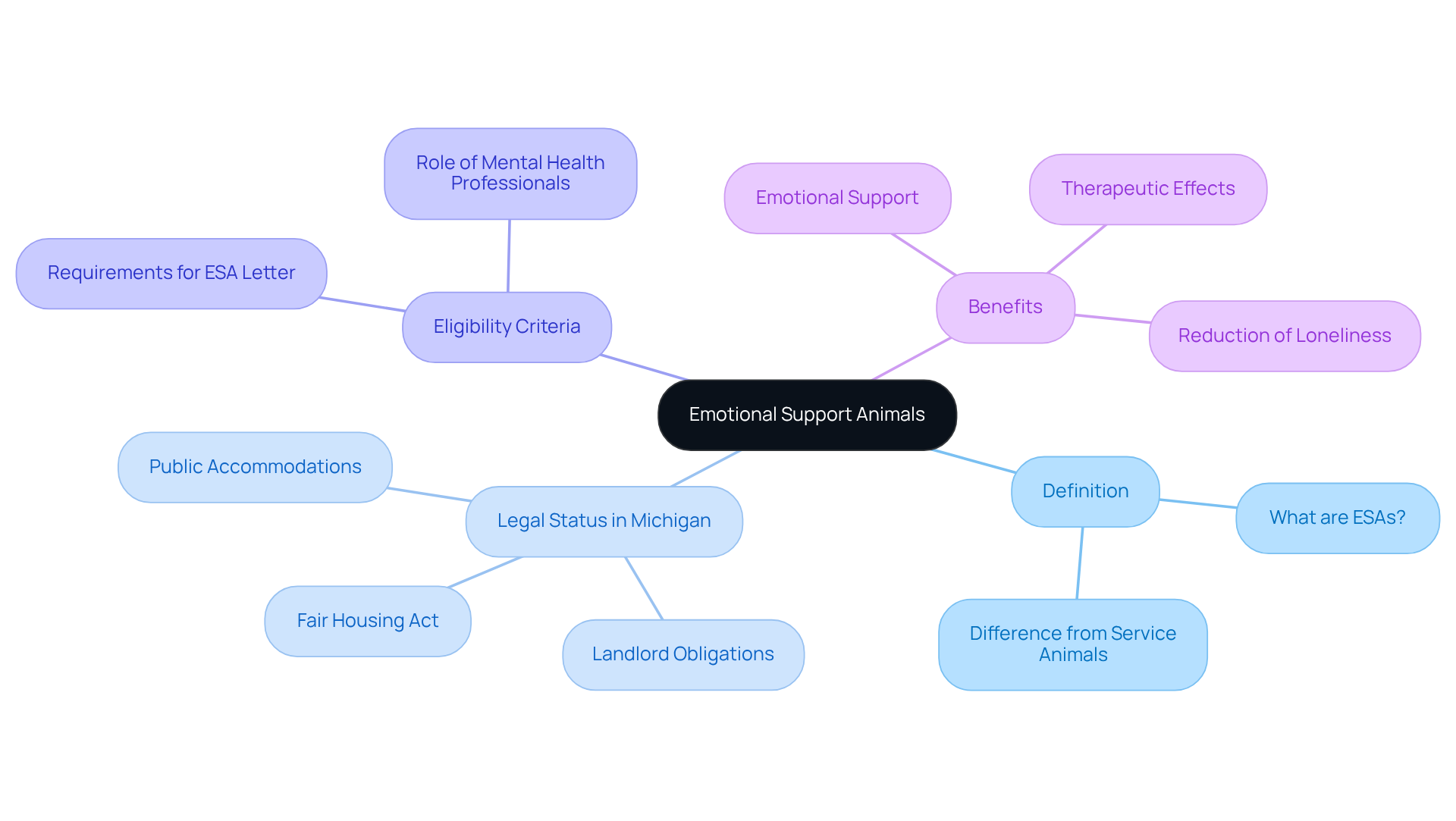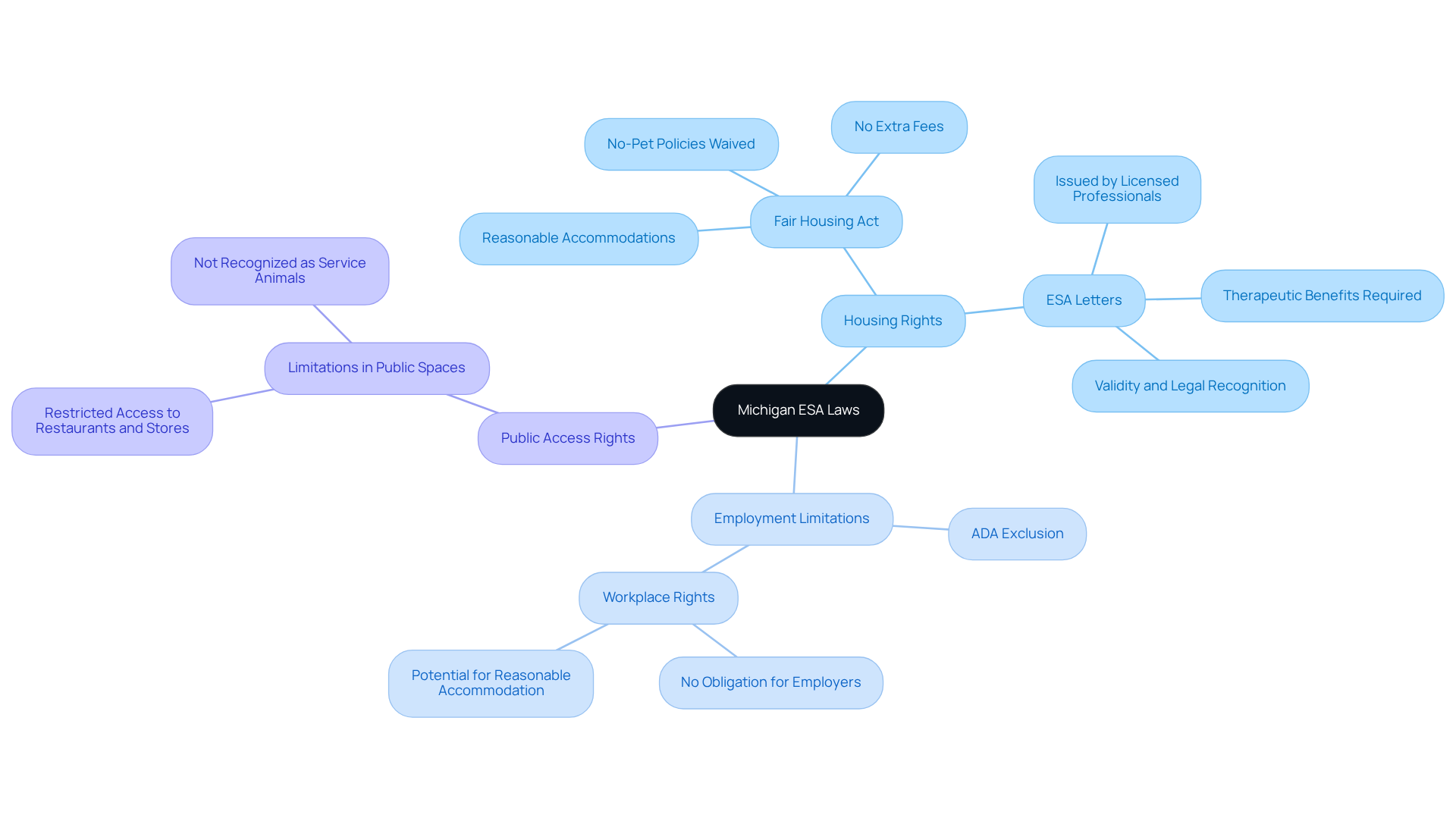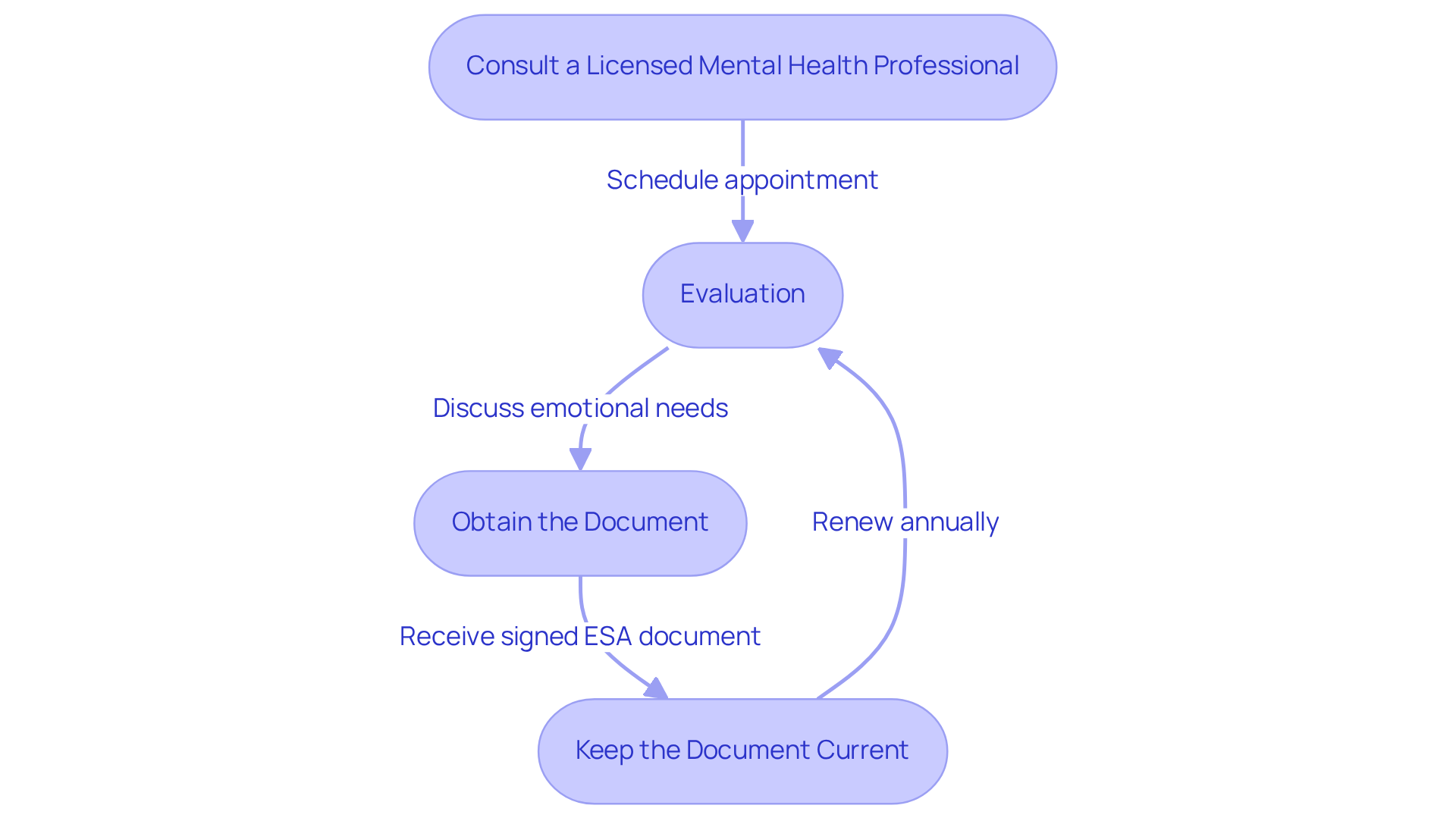

Michigan Emotional Support Animal Laws: Your Complete Guide
by Lena Park
Last updated: July 9, 2025
Verified and Approved by:
Angela Morris,
MSW, LCSW
Fact Checked

Overview
This article serves as a compassionate guide to understanding Michigan’s emotional support animal (ESA) laws. It thoughtfully outlines their legal status, housing rights, and the process of obtaining a legitimate ESA letter. While ESAs are recognized under the Fair Housing Act, it’s important to note that they do not share the same public access rights as service animals. Recognizing these distinctions is crucial for individuals seeking the emotional support they need.
For many, the journey through mental health challenges can feel isolating and overwhelming. The presence of an ESA can provide comfort and stability, helping to alleviate some of the burdens faced daily. Understanding the legal framework surrounding ESAs is a vital step in securing this support.
By navigating the process of obtaining an ESA letter, individuals can take a meaningful step towards enhancing their well-being. This letter not only validates the need for emotional support but also opens doors to housing opportunities that may otherwise feel closed.
As you explore these laws and your rights, remember that you are not alone. There are resources and support systems in place to guide you through this process. Your emotional journey is important, and having an ESA can be a significant part of your healing path.
Introduction
Understanding the legal landscape surrounding Emotional Support Animals (ESAs) in Michigan is essential for those seeking comfort and companionship in their emotional journeys. Many individuals face emotional challenges that can feel overwhelming, and knowing that the Fair Housing Act provides crucial protections for ESA owners can bring a sense of relief. It allows individuals to find solace in understanding their rights, especially in housing situations that may otherwise feel restrictive.
Yet, navigating the complexities of ESA laws can be daunting. What challenges do ESA owners encounter in a state that acknowledges their need for support but restricts access in other areas? This journey can be filled with uncertainty, but there is hope and support available to help guide you through these difficulties.
Define Emotional Support Animals and Their Legal Status in Michigan
Emotional Support Creatures offer comfort and assistance to those grappling with emotional or psychological conditions. Unlike service animals, which are trained for specific tasks, emotional support animals do not require specialized training.
In Michigan, emotional support animal laws recognize these animals under federal law, particularly the Fair Housing Act (FHA). This law aligns with Michigan emotional support animal laws, allowing individuals with disabilities to keep their emotional support animals in housing units that typically prohibit pets.
It’s essential to understand that while service dogs do not need to be certified or registered, obtaining certification can enhance credibility and ensure that the service dog has received proper training. This distinction is crucial for individuals seeking to understand their rights and the legal protections available under Michigan emotional support animal laws.
Additionally, service dog owners enjoy full public access rights under the Americans with Disabilities Act (ADA), enabling them to bring their service dogs into public spaces and secure housing accommodations. However, Michigan lacks specific state laws governing educational savings accounts, which are generally aligned with federal guidelines, including the ADA.
At Wellness Wag, we are dedicated to empowering individuals through accessible Emotional Support Animal Letters, guiding them on their journey toward the life-changing companionship that emotional support animals can provide. To qualify for an ESA letter, individuals must meet specific eligibility criteria, including being of legal age and possessing a diagnosed emotional or psychological condition.
The therapeutic benefits of emotional support animals are widely recognized, providing essential assistance and companionship to those in need.

Explore Michigan ESA Laws: Housing, Employment, and Public Access Rights
In Michigan, many individuals face emotional challenges that can feel overwhelming. For those who rely on Emotional Support Animals (ESAs), the Fair Housing Act (FHA) offers a glimmer of hope. This federal law mandates that landlords provide reasonable accommodations for tenants with ESAs, even in properties with strict no-pet policies. Therefore, if you have a valid ESA letter from a licensed mental health professional, landlords cannot deny you housing based solely on the presence of your emotional support companion. This legal framework is crucial for individuals seeking to live harmoniously with their ESAs, free from discrimination.
However, it’s important to recognize that the landscape changes in the workplace. Unlike housing, Michigan employers are not obligated to permit emotional support animals on their premises, as the Americans with Disabilities Act (ADA) does not recognize them as service animals. Understanding this distinction is vital for ESA owners under Michigan emotional support animal laws, as it limits their rights regarding emotional support animals in employment settings.
Moreover, public access rights for ESAs are also limited. While service animals are trained to perform specific tasks for individuals with disabilities, emotional support animals do not enjoy the same access in public spaces like restaurants or stores. This limitation highlights the importance of comprehending the specific legal protections and restrictions surrounding Michigan emotional support animal laws. By doing so, owners can effectively advocate for their rights and navigate the complexities of housing and employment situations with greater confidence and understanding.

Obtain a Legitimate ESA Letter in Michigan: Steps and Requirements
Obtaining a legitimate ESA document in Michigan is a vital step in addressing your emotional health needs in accordance with Michigan emotional support animal laws. Here’s how to navigate this process with care and support:
-
Consult a Licensed Mental Health Professional: Begin by scheduling an appointment with a licensed therapist, psychiatrist, or another qualified mental health provider who can truly understand your emotional health needs.
-
Evaluation: During your consultation, take a moment to openly discuss your emotional or psychological condition. Share how an emotional support companion (ESA) can assist in your healing journey. This conversation is essential, as it lays the foundation for your support.
-
Obtain the Document: If your mental health professional determines that an ESA is appropriate for you, they will issue a signed ESA document. This important document should include your name, the animal’s name, and a declaration affirming the necessity of the ESA for your emotional well-being. It’s crucial that it appears on official letterhead and contains the healthcare professional’s license information to ensure its legitimacy.
-
Keep the Document Current: While ESA documents do not have a formal expiration date, they are generally valid for one year. Renewing it yearly is a good practice to ensure compliance with housing regulations. It’s also essential to inform your landlord about your ESA as soon as you receive the documentation, unless your disability is already evident. This letter is key in asserting your rights in housing situations, ensuring that landlords accommodate your ESA without discrimination. Remember, according to Michigan emotional support animal laws, landlords cannot impose pet deposits or additional fees for ESAs unless they can prove the request is unreasonable.
Lastly, please be aware that emotional support animals are not universally recognized for air travel under the Air Carrier Access Act. If you have further questions regarding ESA letters, we encourage you to refer to our FAQs or contact us directly. You are not alone in this journey, and support is available to help you every step of the way.

Debunk Common Myths About Emotional Support Animals in Michigan
Numerous myths surrounding Emotional Support Animals (ESAs) contribute to widespread confusion, often leaving individuals feeling uncertain and unsupported in their emotional journeys.
- Myth: Emotional support animals are the same as service beings.
Reality: While ESAs provide vital emotional support, they lack the specific training to perform tasks like service animals, which assist individuals with disabilities through designated functions. This distinction is crucial for understanding the unique roles both types of animals play in our lives. - Myth: Anyone can obtain an ESA document.
Reality: A legitimate ESA letter must be issued by a licensed mental health professional who has thoughtfully assessed the individual’s need for an ESA. This ensures that the letter is valid and compliant with legal standards, offering peace of mind to those seeking support. - Myth: Emotional support animals have the same public access rights as service animals.
Reality: Unlike service animals, emotional support animals do not possess the same access rights in public spaces. They are not permitted in areas where service animals are allowed, such as restaurants or stores. Understanding these limitations can help ESA owners navigate their experiences more effectively. - Myth: Emotional support animals require special certification.
Fact: There is no formal certification procedure for emotional support animals; a legitimate document from a mental health expert is sufficient to demonstrate the necessity for an emotional support animal. This simplicity can alleviate some of the stress associated with obtaining support.
Comprehending these myths is crucial for emotional support animal owners in Michigan, as it empowers them to effectively navigate the Michigan emotional support animal laws and their rights and responsibilities. The Fair Housing Act allows individuals to live with an ESA in a building that doesn’t permit pets, a critical point for ESA owners facing housing challenges.
Moreover, Wellness Wag offers a streamlined online platform for obtaining ESA letters, ensuring that individuals can easily access the support they need. Testimonials from satisfied clients highlight the positive impact of ESAs on their lives, reinforcing the importance of understanding these legal distinctions. As you reflect on your own experiences, remember that support is available, and you are not alone on this journey.
Conclusion
Understanding the intricacies of Michigan’s emotional support animal laws is essential for individuals seeking the companionship and comfort that these animals provide. Many face emotional and psychological challenges, and emotional support animals play a vital role in their lives. The legal recognition of these animals under the Fair Housing Act allows individuals to live with their ESAs even in pet-restricted housing, offering a sense of security and solace. However, it is crucial to grasp the distinctions between emotional support animals and service animals, as the rights and access granted to each differ significantly.
Obtaining a legitimate ESA letter is a necessary step for those who wish to enjoy these benefits. This letter not only affirms the need for an emotional support animal but also outlines the rights associated with housing under the FHA. Yet, it is important to recognize the limitations that exist in employment and public spaces. While emotional support animals offer invaluable support, their owners must navigate specific legal frameworks to ensure their rights are upheld. Have you ever felt overwhelmed by the myths surrounding ESAs? Understanding these misconceptions is equally important, as they can lead to confusion and hinder individuals from accessing the support they deserve.
Ultimately, awareness and education about Michigan’s emotional support animal laws empower individuals to advocate for their rights and secure the companionship of their ESAs. As these laws evolve, staying informed about current regulations and requirements is vital for those relying on emotional support animals for their well-being. Engaging with legitimate providers and mental health professionals can help ensure that individuals receive the necessary documentation and support. This nurturing approach fosters a better understanding of their rights and responsibilities, allowing them to embrace the companionship that ESAs provide.
Frequently Asked Questions
What are emotional support animals (ESAs)?
Emotional support animals provide comfort and assistance to individuals dealing with emotional or psychological conditions. Unlike service animals, they do not require specialized training.
What is the legal status of emotional support animals in Michigan?
In Michigan, emotional support animals are recognized under federal law, specifically the Fair Housing Act (FHA), which allows individuals with disabilities to keep their ESAs in housing units that typically prohibit pets.
Do emotional support animals need certification or registration?
Emotional support animals do not require certification or registration; however, obtaining certification can enhance credibility and ensure the animal has received proper training.
How do emotional support animals differ from service dogs in terms of access rights?
Service dog owners have full public access rights under the Americans with Disabilities Act (ADA), allowing them to bring their service dogs into public spaces. Emotional support animals do not have the same access rights.
What are the eligibility criteria for obtaining an emotional support animal letter?
To qualify for an emotional support animal letter, individuals must be of legal age and have a diagnosed emotional or psychological condition.
What therapeutic benefits do emotional support animals provide?
Emotional support animals offer essential assistance and companionship, which can significantly improve the well-being of individuals in need.
Certify Your Emotional Support Animal Today

Why You Can Rely on Us?
At Wellness Wag, we believe your pet deserves care rooted in both science and compassion. Each article is carefully researched, written in clear language for pet owners, and then reviewed by qualified professionals to ensure the information is evidence-based, current, and practical for real-life care. Our goal is to help you feel confident in making informed decisions about your pet’s health and well-being.
Reviewed by
Angela Morris, MSW, LCSW
Angela is a licensed clinical social worker with 20 years of experience in patient advocacy and community mental health. She has assisted numerous clients with ESA evaluations and brings a deep understanding of disability accommodations, ensuring that all information is accurate, supportive, and practical.

Written by :
Lena Park
Last Updated :
July 9, 2025












